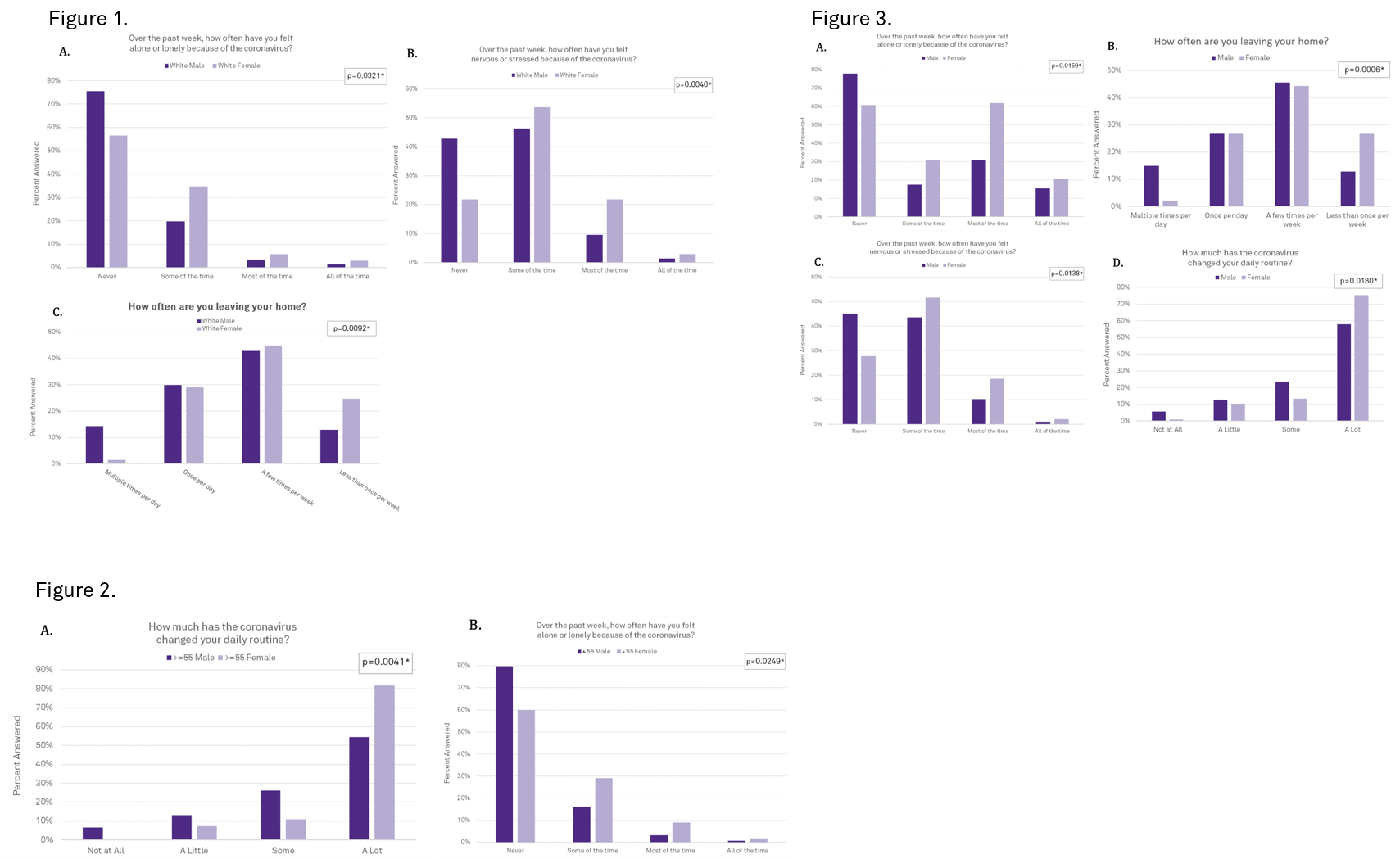White, Older Men Are Less Affected by the Changes of the Covid-19 Pandemic
R. J. Berkowitz, A. Daud, S. Brietigam, T. S. Taylor, J. Carter, M. A. Callegari, B. Borja-Cacho, J. C. Caicedo, D. Simpson, D. P. Ladner
Surgery, Northwestern Medicine, Chicago, IL
Meeting: 2021 American Transplant Congress
Abstract number: LB 66
Keywords: Kidney, Liver, Psychosocial, Quality of life
Topic: Clinical Science » Infectious Disease » COVID-19
Session Information
Session Name: COVID-19
Session Type: Poster Abstract
Session Date & Time: None. Available on demand.
Location: Virtual
*Purpose: This study explores quality of life and lifestyle changes due to the COVID-19 pandemic among pre- and post- liver (LT) and kidney (KT) transplant patients across race, age, and gender.
*Methods: Patients listed (pre) for liver transplant (LT) or kidney transplant (KT) and recipients (post) of LT and KT were prospectively enrolled at a large single center from 5/2020 – 1/2021. Demographics were collected from the EHR. The Chicago COVID-19 Comorbidities (C3) survey was administered via phone by trained research assistants to ascertain patient knowledge about COVID-19. Chi-Square or Fisher’s Exact tests were used (p<0.05).
*Results: A total of 310 pre- and post-LT and KT patients were enrolled (Table 1), with 187 (60%) KT patients and 122 (40%) LT patients. The mean age group for the cohort was 55-64, 104 (34%) were female, 228 (74%) were White, 45 (15%) were Black, 43 (14%) were Hispanic, and 251 (87%) had some college education. 26 (8%) patients had known COVID-19, 22 (85%) were post- LT or KT. There were no significant differences in COVID-19 diagnoses between genders or organ category (Table 2).
Compared to men, women felt lonelier (Fig 1A, p=0.0159), more nervous or stressed (Fig 1C, p= 0.0138), and left their home less frequently (Fig 1B, p= 0.0006) due to the pandemic. Specifically, white men left their homes more (Fig 3C, p= 0.0092) than white women, and a higher percentage of white men “never” felt nervous or stressed (Fig 3B, p= 0.004) or were “never” lonely because of the coronavirus (Fig 3A, p=0.0321) compared to white women. Further, women ≥55 reported that their routines changed more (Fig 2A, p= 0.0041 and felt lonelier (Fig 2B, p= 0.0249) than men ≥55 because of the coronavirus.
*Conclusions: It has been previously demonstrated that women have shouldered a bigger mental health burden during the pandemic. Our findings show that this holds within the transplant population across age and race. Though our population is primarily male and chronically ill, that did not seem to affect behaviors and attitudes towards COVID-19. Thus, targeted social support for this particularly vulnerable population may be beneficial in closing this mental health gap.
To cite this abstract in AMA style:
Berkowitz RJ, Daud A, Brietigam S, Taylor TS, Carter J, Callegari MA, Borja-Cacho B, Caicedo JC, Simpson D, Ladner DP. White, Older Men Are Less Affected by the Changes of the Covid-19 Pandemic [abstract]. Am J Transplant. 2021; 21 (suppl 3). https://atcmeetingabstracts.com/abstract/white-older-men-are-less-affected-by-the-changes-of-the-covid-19-pandemic/. Accessed March 2, 2026.« Back to 2021 American Transplant Congress


